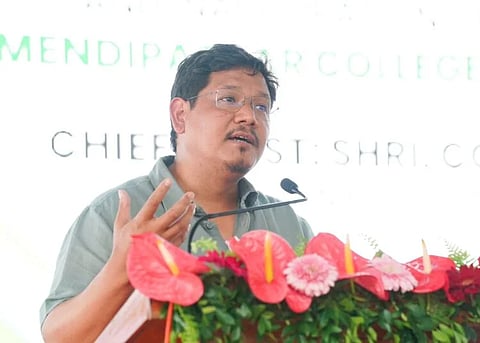
- Home
- Live Blog
- Breaking News
- Top Headlines
- Cities
- NE News
- Sentinel Media
- Sports
- Education
- Jobs

CORRESPONDENT
SHILLONG: Meghalaya Chief Minister Conrad K. Sangma has clarified the operational model for the upcoming Tura Medical College and Hospital (TMCH), in response to growing public speculation and confusion. Speaking at a public event in Mendipathar, Sangma assured that the institution will remain government-owned and will not be handed over entirely to any private entity. He explained that the college will be run under a clearly defined public-private partnership (PPP) model, where the government will retain ownership while certain administrative functions will be managed by a private partner.
Sangma acknowledged the challenges involved in operationalizing the Tura Medical College and Hospital, particularly in the recruitment of qualified professionals and doctors. He noted that Meghalaya is currently facing a shortage of medical experts, which complicates staffing the institution adequately. To address this, the government has decided to involve a private sector partner who will take responsibility for the academic management of the college.
According to the Chief Minister, although academic operations will be handled by the private entity, the majority of medical college seats will be reserved for students from Meghalaya. A smaller portion of seats will be allocated to the private management, which will enable them to oversee faculty administration and handle salary disbursements. Despite the involvement of the private sector in the academic sphere, Sangma emphasized that the hospital itself will continue to function as a fully government-run institution. He reiterated that both the hospital and college will remain under government ownership.
Clarifying further, Sangma explained that students from Meghalaya will be admitted under the state quota, while a limited number of seats will fall under a management quota controlled by the private partner. This dual system aims to balance public interest with the practical needs of operating a medical institution in the current context of limited human resources.
The Chief Minister highlighted the reasons for adopting the PPP model, pointing to the severe shortage of qualified faculty and specialists within the state. He stressed that running a medical college requires compliance with National Medical Commission (NMC) and Medical Council of India guidelines, which mandate experienced teaching staff. Given the difficulties faced in staffing the Shillong Medical College, the government opted for a joint venture approach for TMCH. This model is designed to clearly define the roles of both the public and private sectors to ensure smooth functioning.
Under the terms of this partnership, the private entity will manage academic responsibilities, including faculty recruitment, in line with NMC regulations. However, all financial transactions will be closely monitored and regulated under the provisions of the Meghalaya Private Medical Institutions Ordinance, 2024.
As part of the agreement, the private partner will pay the state an annual lease of Rs 1 crore for the use of infrastructure. This amount will be allocated for maintenance purposes and to cover salaries for government staff associated with the college and hospital.
Also Read: VPP has ‘no takers’ in Garo Hills: Marcuise Marak
Also Watch: